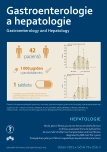-
Články
- Časopisy
- Kurzy
- Témy
- Kongresy
- Videa
- Podcasty
Editorial
Authors: Skladaný Ľ.
Authors place of work: Slovak Medical University, F. D. Roosevelt University Hospital, Banska Bystrica ; HEGITO (Division of Hepatology, Gastroenterology and Liver Transplantation), Department of Internal Medicine II
Published in the journal: Gastroent Hepatol 2022; 76(2): 87
Category: Editorial
Dear readers of the spring liver issue of Gastroenterology and Hepatology,
before you immerse yourselves in the science of the following pages, I would like to give you some food for thought from the realm of humanities. A burning question has been posed to European hepatology and gastroenterology by the war raging just around the corner in our dear old Europe. The question is as old as humankind and, as we have just learned, the answers of we humans are as antipodal as ever.
On 21 March this year, Professor Thomas Berg of Germany, the president of EASL convened a meeting of the presidents of the liver societies of certain countries bordering Ukraine: Poland, Slovakia, Hungary, Moldova and Romania. On behalf of EASL, Professor Berg arbitrated a text of declaration in which EASL condemned the war in Ukraine and supported the peoples of and colleagues from Ukraine. The Declaration was unanimously voted through, together with financial support for Ukraine in the form of donations via donate.unhcr.com/en/ukraine.
However, some of the leaders demanded that EASL assume a much more radical position: to expel Russian hepatologists from the professional community altogether and not allow them to attend any EASL events, including the International Liver Congress 2022. Various official statements of position were evoked – a mild statement from the UEG on one hand and, a more radical statement from the ESCMID on the other; together with names of science not to be forgotten or thrown out of the window for their ethnicity or nationality. Heated discussion has followed for days on end via the internet.
Caught unawares by this millenia-long dilemma operating in hepatology and gastroenterology, I decided to forward it to you – gastroenterologists and hepatologists from the region with intimate historical experience – in order to try to scrutinise together our feelings as compared to our thoughts and knowledge. What side are we on? In our unquestionable quest for a better world, which evidence-based approach do we consider to be a more effective way to lasting peace? And, for that matter, is there any high-quality evidence to support our standpoint – a kind of a meta-analysis of therapeutic approaches to evil that Czech and Slovak hepatology and gastroenterology could leverage? Literature on the topic is voluminous and opinions vary.
An eye for an eye
A tooth for a tooth
Collective guilt
Viktor E Frankl
Hannah Arendt
I have a dream
Socrates
I hope that when you read Gastroenterology and Hepatology, you will be unimpeded by anything other than your thoughts.
Yours sincerely
Ľubomír Skladaný, MD, PhD
hepatology coeditor
Štítky
Detská gastroenterológia Gastroenterológia a hepatológia Chirurgia všeobecná
Článek Kvíz z klinické praxeČlánek Správná odpověď na kvíz
Článok vyšiel v časopiseGastroenterologie a hepatologie
Najčítanejšie tento týždeň
2022 Číslo 2- Metamizol jako analgetikum první volby: kdy, pro koho, jak a proč?
- Kombinace metamizol/paracetamol v léčbě pooperační bolesti u zákroků v rámci jednodenní chirurgie
- Antidepresivní efekt kombinovaného analgetika tramadolu s paracetamolem
- Parazitičtí červi v terapii Crohnovy choroby a dalších zánětlivých autoimunitních onemocnění
- Srovnání analgetické účinnosti metamizolu s ibuprofenem po extrakci třetí stoličky
-
Všetky články tohto čísla
- Editorial
- Kvíz z klinické praxe
- Riziko jaterní fibrózy ve skupině pacientů operovaných pro zlomeniny proximálního femuru
- Cirrhosis-associated immune dysfunction (CAID) – causes, phenotypes and consequences
- Transplantace jater pro PECom napodobující hepatocelulární karcinom
- De novo non-alcoholic fatty liver disease after liver transplantation and liver fibrosis diagnosed by magnetic resonance over 2 years
- Hepato-renálna manifestácia neliečenej ťažkej hypotyreózy
- Ketoanaloga esenciálních aminokyselin u pacientů s idiopatickými střevními záněty (IBD) a chronickým onemocněním ledvin (CKD) v přípravě na transplantaci ledviny
- Doporučený postup České hepatologické společnosti ČLS JEP pro diagnostiku a léčbu akutních porfyrií – doplnění 2022
- Perorální léčba vitaminem B12 u pacientů po ileokolické resekci pro Crohnovu nemoc
- Nízkoobjemový roztok polyetylenglykolu s askorbátem (PLENVUTM) – nová generace očistných přípravků střeva s vysokou efektivitou a dobrou tolerancí
- Liver function test abnormality in paediatric patients with Covid-19 – a single-centre study in the south of Iran
- Tofacitinib v léčbě ulcerózní kolitidy – vlastní zkušenosti
- Výjezdní zasedání výboru ČGS ČLS JEP v Českých Budějovicích
- Výběr z mezinárodních časopisů
- Prim. MUDr. Štefan Šafár (28. 7. 1938 – 19. 3. 2022)
- Životné jubileum poprednej slovenskej gastroenterologičky Márie Zakuciovej
- Správná odpověď na kvíz
- Budějovice gastroenterologické 2022 6.–7. dubna 2022
- Kreditovaný autodidaktický test: hepatologie
- Primární biliární cholangitida (PBC) – aktualizace doporučeného postupu České hepatologické společnosti ČLS JEP pro dia gnostiku a léčbu (2022)
- Gastroenterologie a hepatologie
- Archív čísel
- Aktuálne číslo
- Informácie o časopise
Najčítanejšie v tomto čísle- Riziko jaterní fibrózy ve skupině pacientů operovaných pro zlomeniny proximálního femuru
- Ketoanaloga esenciálních aminokyselin u pacientů s idiopatickými střevními záněty (IBD) a chronickým onemocněním ledvin (CKD) v přípravě na transplantaci ledviny
- Transplantace jater pro PECom napodobující hepatocelulární karcinom
- Perorální léčba vitaminem B12 u pacientů po ileokolické resekci pro Crohnovu nemoc
Prihlásenie#ADS_BOTTOM_SCRIPTS#Zabudnuté hesloZadajte e-mailovú adresu, s ktorou ste vytvárali účet. Budú Vám na ňu zasielané informácie k nastaveniu nového hesla.
- Časopisy




